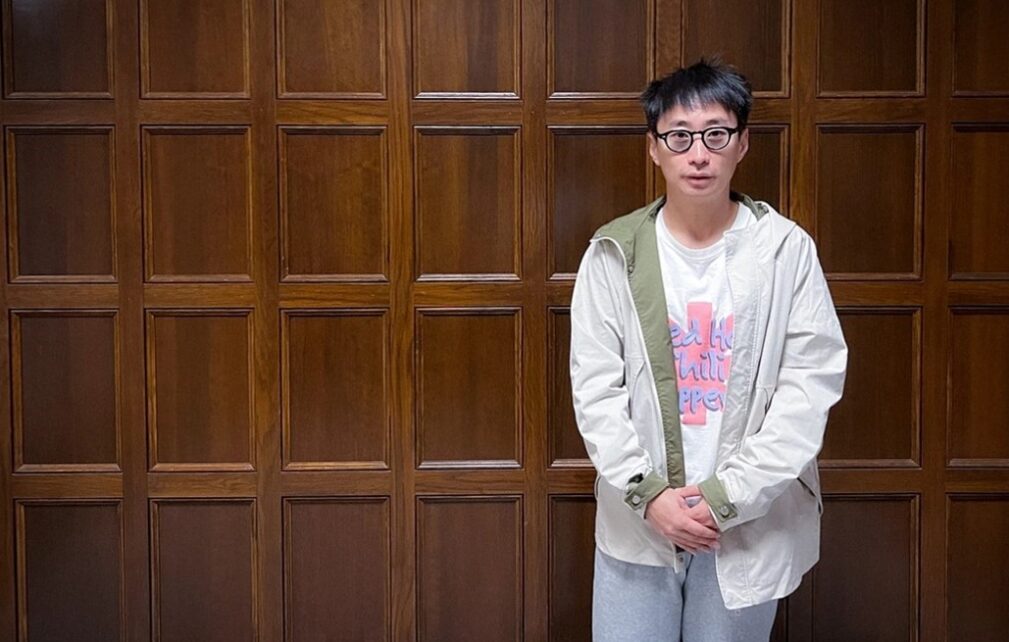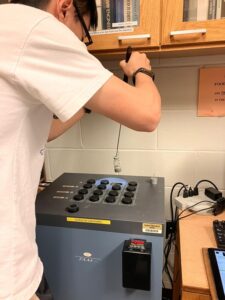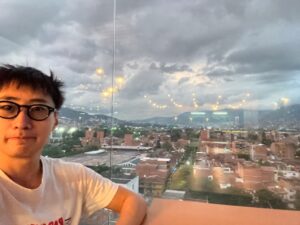
Meet Our Grad Student Scholars is a series from Illinois-Indiana Sea Grant (IISG) celebrating the students and research funded by our scholars program. To learn more about our faculty and graduate student funding opportunities, visit Fellowships & Scholarships.
Yizhou Lin, a Ph.D. student in the Sustainable Infrastructure and ManUfacturing Lab at Purdue University School of Construction Management Technology, is exploring sustainable solutions for the construction material industry. Lin’s research is driven by a desire to explore innovative solutions that address this critical issue. Specifically, he is investigating the feasibility of using bottom sediments from Lake Michigan as a sustainable recycling material to enhance the efficiency of concrete use.
The cement industry is estimated to be responsible for approximately 7−8% of global CO2 emissions. The process of creating cement involves heating limestone and other raw materials to extremely high temperatures, resulting in the release of carbon dioxide.

Lin is testing the amount of heat produced in concrete paste samples.
Concrete, as we know it, is composed of various key components, including cement, aggregates, water, supplementary materials, and additives. The additives play various essential roles in concrete mixtures, such as improving workability, reducing or accelerating setting time, and enhancing strength. Yizhou Lin’s goal is to recycle and reuse bottom sediments from Lake Michigan and evaluate the performance enhancement of the cement and concrete materials with bottom sediments added.
The increasing development of water transportation and port terminal infrastructures generates significant volumes of sediments, including dredged materials. Moreover, the Great Lakes basin faces a considerable contamination problem and harbors toxic substances that cause harm to the local ecological system. Using Great Lakes bottom sediment as an initial ingredient in concrete not only promotes the reuse of materials but also addresses the pressing contamination issue.
Lin’s research journey began with the direct collection of samples from the lake bottom. These materials need to be properly dried and sieved to select the right particle size for use as additives. At this stage, his work primarily focuses on the rheological principle (rheology is the study of flow behavior). For instance, the concept of yield stress and viscosity in fresh cement and concrete represents the point at which the paste transitions from a solid-like, immobile state to a flowable state when subjected to shear forces. He is exploring how additives can influence this yield stress and viscosity. Understanding the principles of rheology could be a game-changer in the context of introducing lake bottom sediments as potential additives. Yizhou’s mission is to decipher how various additives, such as the lake bottom sediment he’s investigating, can influence the crucial rheological behavior of fresh cement and concrete.
By understanding the rheology of fresh cement and concrete, scientists and builders can make concrete better. They can change how they mix the materials with different additives and decide how long to mix everything. This helps them handle the materials well, and make the concrete strong. Now, Lin’s research moves to the next step: how to make concrete more sustainable and durable? That’s the big question for the next phase of the study.

Lin is a world-traveling scholar. He finished his undergraduate degree in New Zealand and his Master’s in Singapore.
To find the best way to use sediment from the lake in concrete, Yizhou is creating a computer model. You might think of it like a video game that lets him see how different materials affect the concrete. He’s testing a wide variety of measurements, like how thick the concrete gets, how strong it is, and how it affects the environment and cost.
Lin isn’t doing this all by himself, but rather using advanced computer algorithms to help him.
“These algorithms are like super-smart helpers that can look at a lot of information and figure out the best ways to use the lake sediment in concrete,” he said. “It’s like a mix of science and computer magic that’s going to help us make construction more eco-friendly and better.
“I’m incredibly excited about the potential of incorporating bottom sediment into construction materials,” Lin added. “It’s like piecing together a complex puzzle where we gather information bit by bit, ultimately assembling the bigger picture to determine its viability.”
Lin finds deep inspiration in traveling around the world, a journey that consistently prompts reflections on the profound connections between humans and nature. This exploration leads to a greater understanding and appreciation of our planet’s diverse ecosystems and cultures.
Illinois-Indiana Sea Grant is a partnership between NOAA, University of Illinois Extension, and Purdue University Forestry and Natural Resources, bringing science together with communities for solutions that work. Sea Grant is a network of 34 science, education and outreach programs located in every coastal and Great Lakes state, Lake Champlain, Puerto Rico and Guam.

